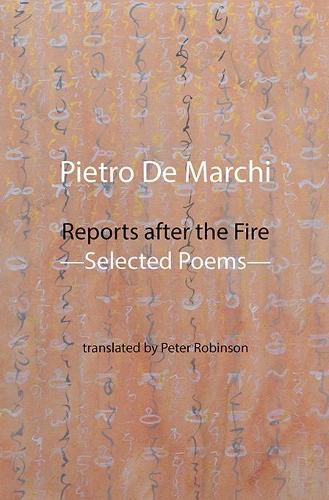Readings Newsletter
Become a Readings Member to make your shopping experience even easier.
Sign in or sign up for free!
You’re not far away from qualifying for FREE standard shipping within Australia
You’ve qualified for FREE standard shipping within Australia
The cart is loading…






This title is printed to order. This book may have been self-published. If so, we cannot guarantee the quality of the content. In the main most books will have gone through the editing process however some may not. We therefore suggest that you be aware of this before ordering this book. If in doubt check either the author or publisher’s details as we are unable to accept any returns unless they are faulty. Please contact us if you have any questions.
Pietro De Marchi was born in Seregno, Milan, in 1958, and has lived and worked for much of his life in Zurich where he is a professor of Italian at the university. A widely published critic and editor of scholarly editions, he is the author of two volumes of imaginative prose and three extensive collections of poetry, from which Reports after the Fire: Selected Poems generously draws, adding a section of uncollected work. As his translator Peter Robinson notes in the book’s substantial introduction, the two key poles of De Marchi’s life place him firmly within the tradition of the so-called Lombard Line, including poets such as Vittorio Sereni and Luciano Erba, whose work is characterised by an acute attention to their immediate surroundings, settings evoked with strong affective bonds and acutely turned historical ironies. De Marchi has affinities, too, with Giorgio Orelli and Fabio Pusterla, poets from the Italian-speaking area of southern Switzerland who share aesthetic principles with their Milanese allies. The poems translated in Reports after the Fire are distinguished by a clear-focused attention to the lives of others, especially children, to the intersections of language and identity, location and sensibility, clarifying and sharing experiences of displacement and survival which De Marchi evokes with a finely tuned ear for idiom, allusion and cadence, poems in which, as Giorgio Orelli put it, ‘the soul seems to expand into all that we look at and are looked at by, in a sort of strange holiday.
$9.00 standard shipping within Australia
FREE standard shipping within Australia for orders over $100.00
Express & International shipping calculated at checkout
This title is printed to order. This book may have been self-published. If so, we cannot guarantee the quality of the content. In the main most books will have gone through the editing process however some may not. We therefore suggest that you be aware of this before ordering this book. If in doubt check either the author or publisher’s details as we are unable to accept any returns unless they are faulty. Please contact us if you have any questions.
Pietro De Marchi was born in Seregno, Milan, in 1958, and has lived and worked for much of his life in Zurich where he is a professor of Italian at the university. A widely published critic and editor of scholarly editions, he is the author of two volumes of imaginative prose and three extensive collections of poetry, from which Reports after the Fire: Selected Poems generously draws, adding a section of uncollected work. As his translator Peter Robinson notes in the book’s substantial introduction, the two key poles of De Marchi’s life place him firmly within the tradition of the so-called Lombard Line, including poets such as Vittorio Sereni and Luciano Erba, whose work is characterised by an acute attention to their immediate surroundings, settings evoked with strong affective bonds and acutely turned historical ironies. De Marchi has affinities, too, with Giorgio Orelli and Fabio Pusterla, poets from the Italian-speaking area of southern Switzerland who share aesthetic principles with their Milanese allies. The poems translated in Reports after the Fire are distinguished by a clear-focused attention to the lives of others, especially children, to the intersections of language and identity, location and sensibility, clarifying and sharing experiences of displacement and survival which De Marchi evokes with a finely tuned ear for idiom, allusion and cadence, poems in which, as Giorgio Orelli put it, ‘the soul seems to expand into all that we look at and are looked at by, in a sort of strange holiday.